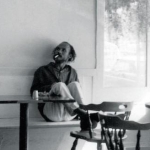Scorpio, or, The Scorpion by Joseph Gordon Macleod

Now as the farmer sits at his accounts
Reviewing fleeces neath deciduous beeches
And notes in red contented ink
Net profits of his quite impossible serenity;
As graded apples marketably beautiful
Into the bushel-baskets sink
And trussed hay to the tin roof reaches,
And where red tiles through darkening trees are reared
Read Poem Reviewing fleeces neath deciduous beeches
And notes in red contented ink
Net profits of his quite impossible serenity;
As graded apples marketably beautiful
Into the bushel-baskets sink
And trussed hay to the tin roof reaches,
And where red tiles through darkening trees are reared
0
What Shall I Tell My Children Who Are Black (Reflections of an African-American Mother) by Margaret Burroughs

1963
What shall I tell my children who are black
Of what it means to be a captive in this dark skin
What shall I tell my dear one, fruit of my womb,
Of how beautiful they are when everywhere they turn
They are faced with abhorrence of everything that is black.
Villains are black with black hearts.
Read Poem Of what it means to be a captive in this dark skin
What shall I tell my dear one, fruit of my womb,
Of how beautiful they are when everywhere they turn
They are faced with abhorrence of everything that is black.
Villains are black with black hearts.
0
What Shall We Tell Our Children? An Addenda, 1973 by Margaret Burroughs

A lot of water has passed under the bridge since 1963. Then, my concernwas particularly for my own people and this version was written especially for them. I am happy that it has done and is doing its job. However, I want it to be known, that I am not a proponent of the concept of cultural nationalism. I dearly love and am proud of my good, serious, sincere black people, yet at the same time, my concern is with all people of goodwill no matter the color. I make no mystique of blackness. I am a humanist. Indeed, I am auniversalist. This truth, I know. The liberation of black people in the United States is tightly linked with the liberation of black people in the far flungdiaspora. Further, and more important, the liberation of black and oppressed people all over the world, is linked with the struggles of the workers of the world of every nationality and color against the common oppressors, overlords, and exploiters of their labor.
Thus it was only natural that I should write "What Shall We Tell Our Children?" in 1973. I have tried to tell them the facts of life and the truth as I see it:
I hope I have succeeded.
What shall we tell our children who are black?
What shall we tell our children who are white?
What shall we tell children of every race and hue?
For all children are the children of all of us
Read Poem Thus it was only natural that I should write "What Shall We Tell Our Children?" in 1973. I have tried to tell them the facts of life and the truth as I see it:
I hope I have succeeded.
What shall we tell our children who are black?
What shall we tell our children who are white?
What shall we tell children of every race and hue?
For all children are the children of all of us
0
The Wife-Woman by Anne Spencer

Maker-of-sevens in the scheme of things
From earth to star;
Thy cycle holds whatever is fate, and
Over the border the bar.
Though rank and fierce the mariner
Sailing the seven seas,
He prays, as he holds his glass to his eyes,
Coaxing the Pleiades.
Read Poem From earth to star;
Thy cycle holds whatever is fate, and
Over the border the bar.
Though rank and fierce the mariner
Sailing the seven seas,
He prays, as he holds his glass to his eyes,
Coaxing the Pleiades.
0
Axe Handles by Gary Snyder

One afternoon the last week in April
Showing Kai how to throw a hatchet
One-half turn and it sticks in a stump.
He recalls the hatchet-head
Without a handle, in the shop
And go gets it, and wants it for his own.
A broken-off axe handle behind the door
Is long enough for a hatchet,
Read Poem Showing Kai how to throw a hatchet
One-half turn and it sticks in a stump.
He recalls the hatchet-head
Without a handle, in the shop
And go gets it, and wants it for his own.
A broken-off axe handle behind the door
Is long enough for a hatchet,
0
from The Prodigal: 10 by Derek Walcott

I
The ground dove stuttered for a few steps then flew
up from his path to settle in the sun-browned
branches that were now barely twigs; in drought it coos
with its relentless valve, a tiring sound,
not like the sweet exchanges of turtles in the Song
of Solomon, or the flutes of Venus in frescoes
though all the mounds in the dove-calling drought
Read Poem The ground dove stuttered for a few steps then flew
up from his path to settle in the sun-browned
branches that were now barely twigs; in drought it coos
with its relentless valve, a tiring sound,
not like the sweet exchanges of turtles in the Song
of Solomon, or the flutes of Venus in frescoes
though all the mounds in the dove-calling drought
0
Archibald Higbie by Edgar Lee Masters

I loathed you, Spoon River. I tried to rise above you,
I was ashamed of you. I despised you
As the place of my nativity.
And there in Rome, among the artists,
Speaking Italian, speaking French,
I seemed to myself at times to be free
Of every trace of my origin.
I seemed to be reaching the heights of art
And to breathe the air that the masters breathed,
And to see the world with their eyes.
But still they’d pass my work and say:
"What are you driving at, my friend?
Sometimes the face looks like Apollo’s,
At others it has a trace of Lincoln’s."
There was no culture, you know, in Spoon River,
Read Poem I was ashamed of you. I despised you
As the place of my nativity.
And there in Rome, among the artists,
Speaking Italian, speaking French,
I seemed to myself at times to be free
Of every trace of my origin.
I seemed to be reaching the heights of art
And to breathe the air that the masters breathed,
And to see the world with their eyes.
But still they’d pass my work and say:
"What are you driving at, my friend?
Sometimes the face looks like Apollo’s,
At others it has a trace of Lincoln’s."
There was no culture, you know, in Spoon River,
0
Walking Parker Home by Bob Kaufman

Sweet beats of jazz impaled on slivers of wind
Kansas Black Morning/ First Horn Eyes/
Historical sound pictures on New Bird wings
People shouts/ boy alto dreams/ Tomorrow’s
Gold belled pipe of stops and future Blues Times
Lurking Hawkins/ shadows of Lester/ realization
Bronze fingers—brain extensions seeking trapped sounds
Ghetto thoughts/ bandstand courage/ solo flight
Read Poem Kansas Black Morning/ First Horn Eyes/
Historical sound pictures on New Bird wings
People shouts/ boy alto dreams/ Tomorrow’s
Gold belled pipe of stops and future Blues Times
Lurking Hawkins/ shadows of Lester/ realization
Bronze fingers—brain extensions seeking trapped sounds
Ghetto thoughts/ bandstand courage/ solo flight
0
The Vein by Tom Raworth

But I have been familiar with ruins too long to dislike desolation.
(Lord Byron, November 1816) what happens in any
sovereign body is created
Read Poem (Lord Byron, November 1816) what happens in any
sovereign body is created
0
The Minister of Culture Gets His Wish by Mark Strand

The Minister of Culture goes home after a grueling day at the office. He lies on his bed and tries to think of nothing, but nothing hap-pens or, more precisely, does not happen. Nothing is elsewhere doing what nothing does, which is to expand the dark. But the minister is patient, and slowly things slip away—the walls of his house, the park across the street, his friends in the next town. He believes that nothing has finally come to him and, in its absent way, is saying, “Darling, you know how much I have always wanted to please you, and now I have come. And what is more, I have come to stay.”
Read Poem 0
Ode for the American Dead in Asia by Thomas McGrath

1.
God love you now, if no one else will ever,
Corpse in the paddy, or dead on a high hill
In the fine and ruinous summer of a war
You never wanted. All your false flags were
Of bravery and ignorance, like grade school maps:
Colors of countries you would never see—
Until that weekend in eternity
Read Poem God love you now, if no one else will ever,
Corpse in the paddy, or dead on a high hill
In the fine and ruinous summer of a war
You never wanted. All your false flags were
Of bravery and ignorance, like grade school maps:
Colors of countries you would never see—
Until that weekend in eternity
0
Poste Restante by R. S. Thomas

I want you to know how it was,
whether the Cross grinds into dust
under men’s wheels or shines brightly
as a monument to a new era.
There was a church and one man
served it, and few worshipped
there in the raw light on the hill
in winter, moving among the stones
Read Poem whether the Cross grinds into dust
under men’s wheels or shines brightly
as a monument to a new era.
There was a church and one man
served it, and few worshipped
there in the raw light on the hill
in winter, moving among the stones
0
Envy by Mary Lamb

This rose-tree is not made to bear
The violet blue, nor lily fair,
Nor the sweet mignionet:
And if this tree were discontent,
Or wished to change its natural bent,
It all in vain would fret.
And should it fret, you would suppose
It ne’er had seen its own red rose,
Nor after gentle shower
Had ever smelled its rose’s scent,
Or it could ne’er be discontent
With its own pretty flower.
Like such a blind and senseless tree
Read Poem The violet blue, nor lily fair,
Nor the sweet mignionet:
And if this tree were discontent,
Or wished to change its natural bent,
It all in vain would fret.
And should it fret, you would suppose
It ne’er had seen its own red rose,
Nor after gentle shower
Had ever smelled its rose’s scent,
Or it could ne’er be discontent
With its own pretty flower.
Like such a blind and senseless tree
0
Hazard Faces a Sunday in the Decline by William Meredith

We need the ceremony of one another,
meals served, more love,
more handling of one another with love, less
casting out of those who are not
of our own household.
‘This turkey is either not cooked
enough or it’s tough.’
Read Poem meals served, more love,
more handling of one another with love, less
casting out of those who are not
of our own household.
‘This turkey is either not cooked
enough or it’s tough.’
0
Flaxman by Margaret Fuller

We deemed the secret lost, the spirit gone,
Which spake in Greek simplicity of thought,
And in the forms of gods and heroes wrought
Eternal beauty from the sculptured stone,—
A higher charm than modern culture won
With all the wealth of metaphysic lore,
Gifted to analyze, dissect, explore.
A many-colored light flows from one sun;
Read Poem Which spake in Greek simplicity of thought,
And in the forms of gods and heroes wrought
Eternal beauty from the sculptured stone,—
A higher charm than modern culture won
With all the wealth of metaphysic lore,
Gifted to analyze, dissect, explore.
A many-colored light flows from one sun;
0
Cleon by Robert Browning

"As certain also of your own poets have said"—
(Acts 17.28)
Cleon the poet (from the sprinkled isles,
Lily on lily, that o'erlace the sea
And laugh their pride when the light wave lisps "Greece")—
To Protus in his Tyranny: much health!
Read Poem (Acts 17.28)
Cleon the poet (from the sprinkled isles,
Lily on lily, that o'erlace the sea
And laugh their pride when the light wave lisps "Greece")—
To Protus in his Tyranny: much health!
0
Davis Matlock by Edgar Lee Masters

Suppose it is nothing but the hive:
That there are drones and workers
And queens, and nothing but storing honey —
(Material things as well as culture and wisdom) —
For the next generation, this generation never living,
Except as it swarms in the sun-light of youth,
Strengthening its wings on what has been gathered,
And tasting, on the way to the hive
From the clover field, the delicate spoil.
Suppose all this, and suppose the truth:
That the nature of man is greater
Than nature's need in the hive;
And you must bear the burden of life,
As well as the urge from your spirit's excess —
Well, I say to live it out like a god
Read Poem That there are drones and workers
And queens, and nothing but storing honey —
(Material things as well as culture and wisdom) —
For the next generation, this generation never living,
Except as it swarms in the sun-light of youth,
Strengthening its wings on what has been gathered,
And tasting, on the way to the hive
From the clover field, the delicate spoil.
Suppose all this, and suppose the truth:
That the nature of man is greater
Than nature's need in the hive;
And you must bear the burden of life,
As well as the urge from your spirit's excess —
Well, I say to live it out like a god
0
For Louis Pasteur by Edgar Bowers

“Who is Apollo?” College student How shall a generation know its story
If it will know no other? When, among
Read Poem If it will know no other? When, among
0
A Grammarian's Funeral by Robert Browning

Shortly after the Revival of Learning in Europe Let us begin and carry up this corpse,
Singing together.
Leave we the common crofts, the vulgar thorpes
Each in its tether
Read Poem Singing together.
Leave we the common crofts, the vulgar thorpes
Each in its tether
0
Internal Migration: On Being on Tour by Alan Dugan

As an American traveler I have
to remember not to get actionably mad
about the way things are around here.
Tomorrow I’ll be a thousand miles away
from the way it is around here. I will
keep my temper, I will not kill the dog
next door, nor will I kill the next-door wife,
both of whom are crazy and aggressive
Read Poem to remember not to get actionably mad
about the way things are around here.
Tomorrow I’ll be a thousand miles away
from the way it is around here. I will
keep my temper, I will not kill the dog
next door, nor will I kill the next-door wife,
both of whom are crazy and aggressive
0